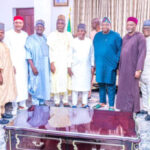The African Centre for Leadership Strategy and Development (Centre LSD) has said that the high cost of elections in the country is having adverse effects on the legislative performance of elected lawmakers.
The Chief of Staff to the Deputy Senate President and founding Executive Director, Center LSD, Dr Otive Igbuzor, said this recently in Abuja at a ‘one-day reflection meeting on the National Assembly (NASS) reformers project with other civil society organizations.
If APC messes you up, come to PDP, Ortom woos Fayemi
62-year-old man drowns in Kwara well
According to him, this happens mostly after the elections of the lawmakers as many of them incurred debt to be elected.
“There is enormous pressure on legislators for constituency projects, contracts and empowerment can affect the performance of their core functions. The high cost of elections can affect legislative performance after elections. Many of them incurred debt to be elected,” Igbuzor said.
He also harped on the need for civil society organizations (CSOs) to be actively involved in all the legislative processes to ensure radical reforms especially as the country moves toward the 2023 generation elections.
Dr Igbuzor noted that the need for CSOs’ engagement in the legislative processes has become imperative as there is an urgent need to scale up in the 10th National Assembly to address some nomocratic issues prevalent in the country.
He said, “This project had thought us that we need to scale up in the 10th National Assembly to ensure that there is more engagement of civil society organizations with the legislative process because we discovered that there are some nomocratic issues in the society that does not interest government and does not interest the private sector such as ethics and moralities, things about climate change, gender equality and women empowerment.”
The Deputy Executive Director, Policy and Legal Advocacy Centre (PLAC), Mrs Omolara Akinyeye, in her presentation titled ‘the 10th National Assembly: Sustaining the gains of the NASS reformers project and opportunities for continuous engagements’, identified one of the greatest challenges of working with the legislature as an external partner to be the issue of timing and the fluidity of the National Assembly.
She said that political interests and wrangling also hamper implementation of projects which are usually timebound.

 Join Daily Trust WhatsApp Community For Quick Access To News and Happenings Around You.
Join Daily Trust WhatsApp Community For Quick Access To News and Happenings Around You.


